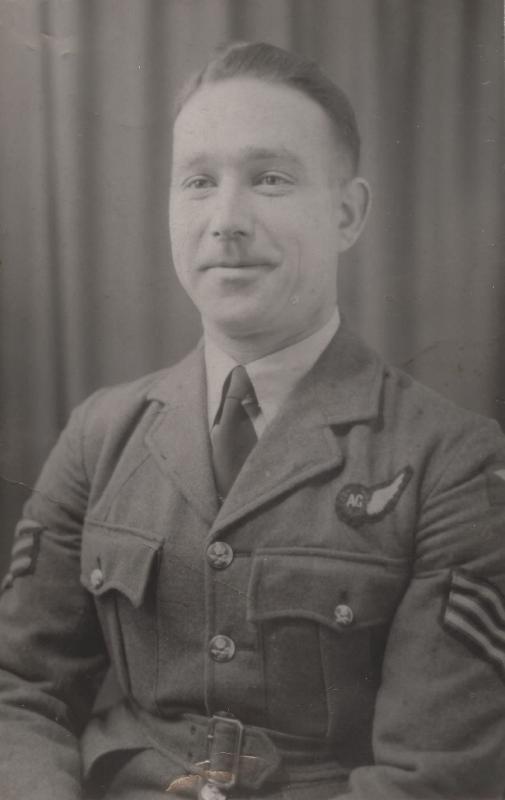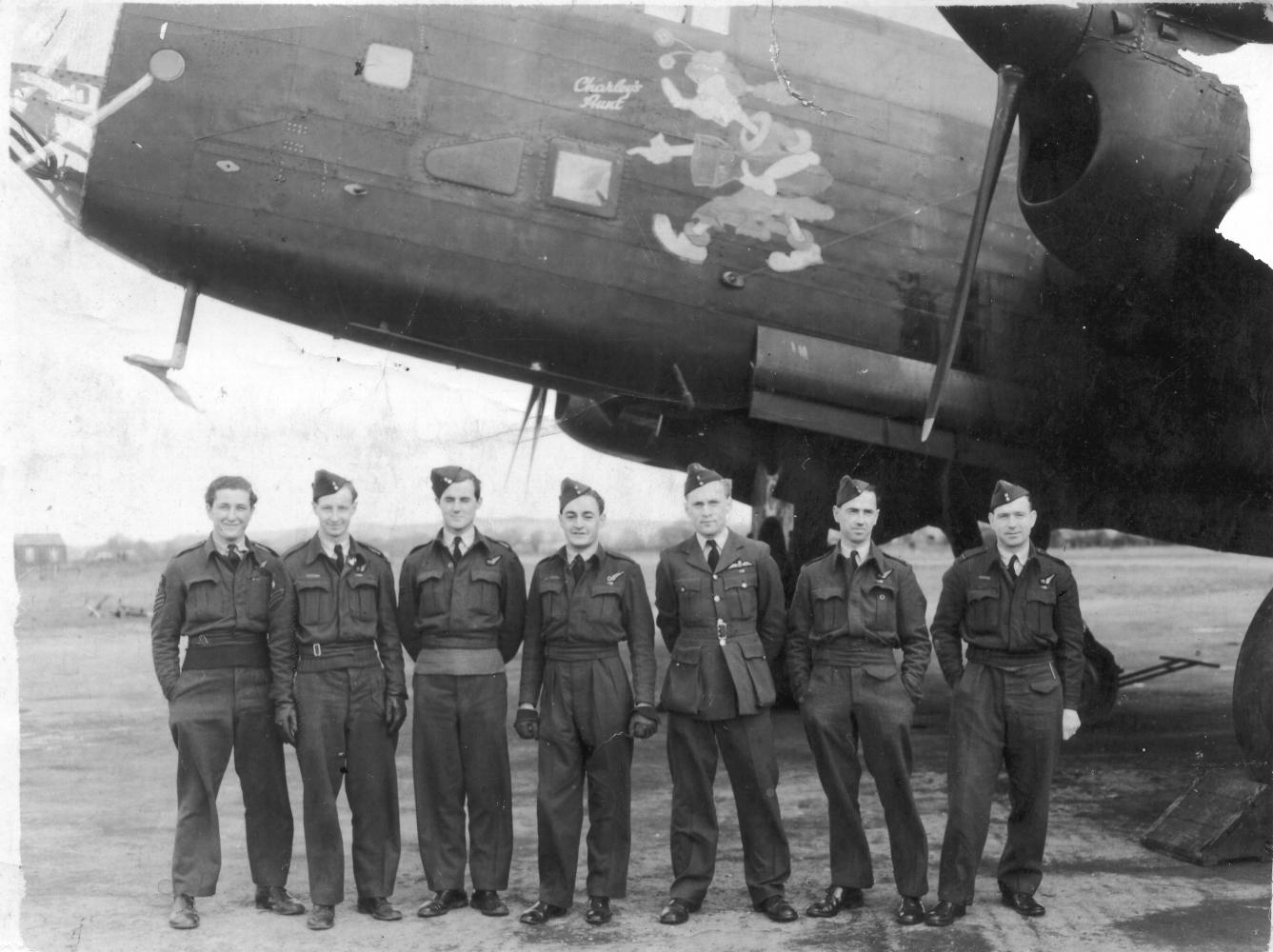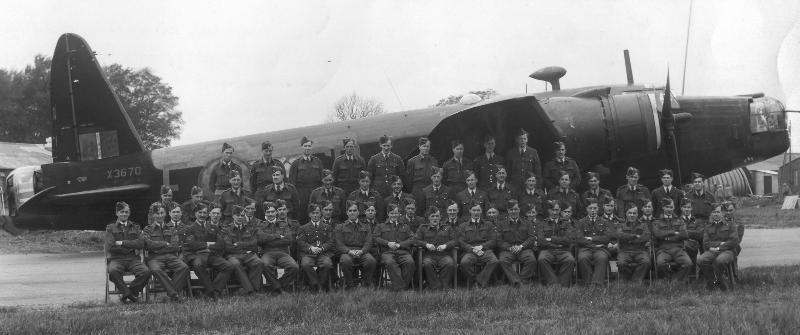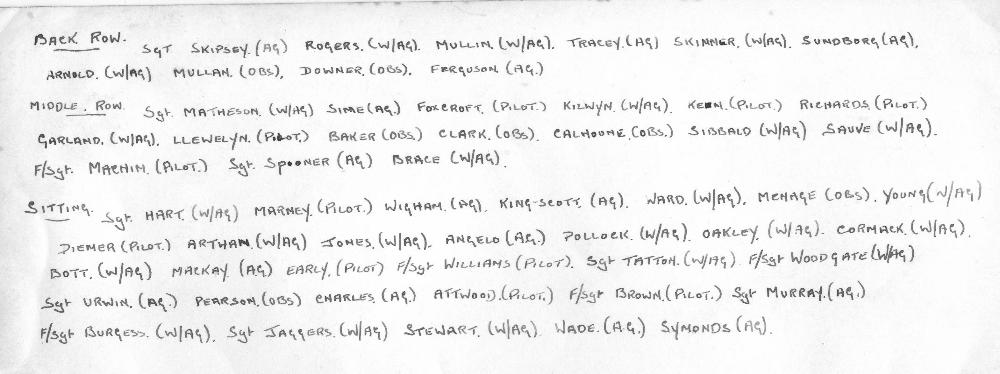102 (Ceylon) Squadron
Tentate et perficite (Attempt and Achieve)
Flying Officer William (Bill) Wigham DFC
Bill survived the war and two tours of duty, we think possibly wiith 101 Sqd before coming to 102.
He was tail gunner for F/O W.H.A. Dick's crew, who refused to fly unless Bill was with them after a stand in AG, Sgt K.J. Peterson was killed during a misson on the 26/11/43 - the day Bill's son Howard was born...
Howard has been in touch with us, and below is a piece Bill's wife Olive wrote in 2001.
Memoirs of a “Tail-End Charlie” (Rear Gunner)
William (Bill) Wigham b 1910. d 1975 memories by his wife Olive Wigham nee Lancaster.
As the war is about forgotten (1939-1945) I thought I’d try to write down some of the things
Bill told me about when he was a rear-gunner in first a Wellington Bomber and then a second
tour in a Halifax.
He had just started to buy an insurance round (C0-0P), which was costly, and couldn’t wait
when war was declared to enlist and I took over his job which meant I had to lodge there and
disliked the job anyway.
He had to do a lot of training and his first lot of “ops” were from St. Neots in a Wellington. At
that time we didn’t have a big airforce so they were the main planes for getting to Germany.
His first pilot was a New Zealander aged about 21-22, but as all crews did they worked well
together and were always doing night raids.
The average ‘life’ was reckoned to be about 9 weeks! So, they were lucky to survive.
As I
can’t remember what happened on the first flights I have just put down what Bill told me
between leaves. His logbook just states where they went but not the details of the actual raids
etc.
At first we didn’t have plenty of bombs & Germans were raining bombs down on London, so
they used to fly over Germany and drop empty sauce (& pop) bottles because they made the
same screaming noise and they hoped to upset the Germans when thrown among the bombs.
They also dropped leaflets to let ordinary Germans know exactly what was happening as
they only had the propaganda that told them they were already winning the war.
The first thing that Bill found on his first posting was that all the manhole covers (drain
covers) had been removed from the station and they were warned where to walk. Apparently
the Americans had eventually joined in and were flying day raids and the rear-gunners had
decided protection wasn’t strong enough and used the covers to sit on!
Bill liked the Wellington - he said it was covered with fabric and it still flew riddled in bullet
holes.
He was moved to the station and was a Flight Sergeant when he met George Snaith, having met him at home, and they were delighted to meet up on duty. When he wasn’t on ‘ops’ - George and Bill used to play darts with the locals, and if he had to land on other airfields George said the locals were very upset and he got a real welcome the next time he could play darts.
They bombed the factories in Germany that were making guns etc. but had trouble in dodging
the fighters.
Bill and crew had to ditch the plane anywhere they could make it and at one GI
station they had the best meals since joining up!
At first there weren't many planes could carry enough fuel to get to Berlin, so they bombed all
the factories they could reach and were very lucky to survive the first 9 weeks over Hamburg.
On one occasion when being chased by fighters he thought he had been hit because he
couldn't’ feel his legs and was very cold, but when they got home he found a bullet had
severed the connecting wire in his flying suit that was the heating circuit, so with a sigh of
relief he was mobile.
After completing the session of ‘ops’ he was sent to Scotland to instruct gunnery. I joined
him in a bed-sit and we felt we were really married at last and it lasted for a year, so we were
both relaxed for the first time and made friends, one of whom I write to after 60 years.
He was commissioned to Pilot Officer and had to get used to being saluted. I found I was
expecting a baby so on his last leave I stayed at home and he was posted to Driffield and back
flying again.
At some time there he did a daylight trip and was amused to see the cars & vans with gas bags
on top as fuel in Belgium.
The planes always went in with incendiaries before the bombers so there was fires already
burning before they arrived.
The German fighters were waiting so they still lost planes. His batwoman got the telegram to him to say I’d had the baby and he had difficulty in getting leave as he was ‘down on battle orders’. He managed to swap and while he was home his crew made a trip and were very badly shot-up, the mid-upper gunner had his head shot off and they were very lucky to get back over the coast.
When Bill went back his pilot said he would refuse to go if any of the regular crew were missing. Bill got a cold with sinus trouble and the GP said he was not to fly and to Bill’s amazement the crew didn’t fly until he was able to carry on.
The pilot was just 21 and knowing Bill had been through the worst relied on him and took any
advice Bill gave when attacked from the rear. I said to him “didn’t he feel any pains on the
Friday morning when I was in labour” but at 8.00 - 8.30am he was too busy getting rid of
fighters!
The worst job was mine-laying. One episode lasted long after the war was over. He was
coming out of anaesthetic after an operation on his knee and started to talk. All he kept saying
was “They said there would be no searchlights. You can read a Bl**** newspaper”
They had to fly very low and as they got to the target the whole place lit up and they were in
full view the whole time. The mid-upper gunner was panicking and Bill had to tell him to shut
up and start firing at the lights and put out as many as they could. Usually when they crossed
the coast on the way home they would all talk but this time no one said a word.
The next morning Bill went out to see about more ammunition. He had used every bullet and
the armourer remarked “you must have had a busy night Sir” and Bill said yes he would need
more bullets. The armourer said “you need four new guns” - the rifling had been taken off
every barrel and the guns were useless.
The new Halifax's and Lancaster's were on Special Mission and I think the pilots were on Sealed
Orders, until they took off and were en-route to Berlin.
Eventually the Germans got what they had done to London, Coventry & Liverpool. He was
on the first of two massive 1000 bomber raids and he never forgot the sight. Bombers of all
sorts were wing-tip to wing-tip. It must have been a horrifying sight from the ground - it is
always the ordinary people of either side who do most of the suffering.
There were some lighter moments too. Bill said they were flying in a large squadron and the
pilot said he didn’t know what was wrong but every time he tried to keep position the others
either side moved away. It wasn’t until the bomb-aimer went to seek the target he found they
were flying with the nose-light on. Bill said maybe that’s why they weren't hit - the Jerries
thought it was one of theirs!
Eventually after completing another sortie he was sent to Rufforth as Assistant Adjutant and
got on very well with the rest of the men. He enjoyed his time there and its in the records of a
congratulation memo for the way he had organised the move of a whole squadron so
efficiently.
He was given the DFC which didn’t actually arrive until he was home. The King was very ill and Bill & I were disappointed at not getting a trip to the palace.
Bill also got the Gold Star (for Europe) and another for ?(no note for what).
No one remembers the war now, as time goes by and we oldies are few, but sometimes I
wonder if any of it was, or is, appreciated. Children are not aware it happened and its not in
the history lessons at school. So many lives given but the thought of what Hitler would have
done with them is beyond belief. They would have been brainwashed against the Jews and
turned into proper little Nazis.
There were lots of things that happened to Bill, but these are the only ones I can remember.
Olive Wigham January 2001
===========================================================================================
101 Squadron - Training ??
We have an amazing photo which we believe was taken when Bill Wigham was flying with 101 Squadron, before he came to 102.
What is incredible about this picture is that we have the names of everyone on the back!
I have added images for both the back and the front and then added a list of everyone named so that the search engines can find them.
Back Row
Sgt Skipsy (AG), Rogers (W/AG), Mullim (W/AG), Tracey (AG), Skinner (W/AG), Sundborg (AG), Arnold (W/AG), Mullan (Obs), Downer (Obs), Ferguson (AG).
Middle Row
Sgt Matheson (W/AG), Sime (AG), Foxcroft (Pilot), Kilwyn (W/AG), Keen (Pilot), Richards (Pilot), Garland (W/AG), Llewelyn (Pilot), Barker (Obs), Clark (Obs), Calhoone (Obs), Sibald (W/AG), Sauve (W/AG), F/Sgt Machin (Pilot), Sgt Spooner (AG), Brace (W/AG).Sitting
Sgt Hart (W/AG), Marney (Pilot), William Wigham (AG), King-Scott (AG), Ward (W/AG), Menage (Obs), Young (W/AG), Diemer (Pilot), Arthan (W/AG), Jones (W/AG), Andelo (AG), Pollock (W/AG), Oakley (W/AG), Cormack (W/AG), Bott (W/AG).
Sitting Front Row
Mackay (AG), Early (Pilot), F/Sgt Williams (Pilot), Sgt Tatton (W/AG), F/Sgt Woodgate (W/AG), Sgt Urwin (AG), Pearson (Obs), Charles (AG), Attwood (Pilot), F/Sgt Brown (Pilot), Sgt Murray (AG), F/Sgt Burgess (W/AG), Sgt Jaggers (W/AG), Stewart (W/AG), Wade (AG), Symonds (AG).
Our thanks go to Bill Leyland for writing out all these names and for also doing some detective work on the plane in the photo... the following is from Bill:
"
The Wimpy in the photo was lost 30/31 May 1942 whilst serving with 101 Squadron.
X3670 was on a mission to Koln from RAF Oakington. I am 99% certain some of its crew are there in the photo!
William Wigham must have done a tour with this Squadron before he joined 102. The crew surnames that appear in the photo are:
Sgt William Harry Arnold W/AG
Sgt Dennis Pearson Obs
Sgt Ivan Bernard Harry Spooner AG
(Three seperate trades for the three surnames)
Anthony De Faye Gardner was the Pilot but there isn't a Gardner listed. Also lost was Sgt Ronald Edward Hart but no Hart listed either.
"
Rufforth
Photo taken we think when Bill was on reserve as Assistant Adjutant at Rufforth. Bill is the man sat almost in the very center of the photo to the left of what looks like the base commander??





